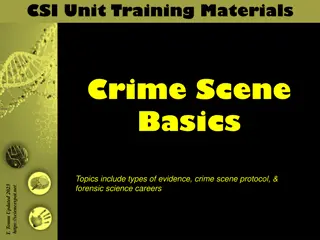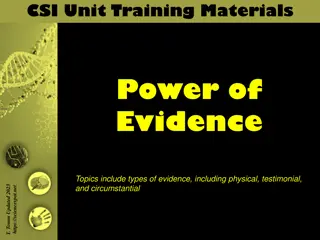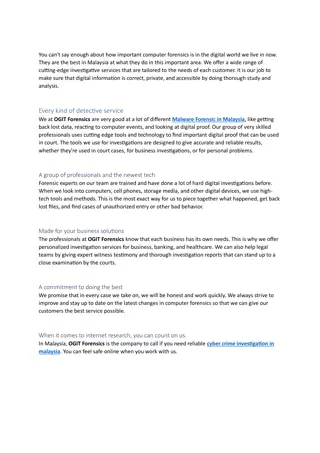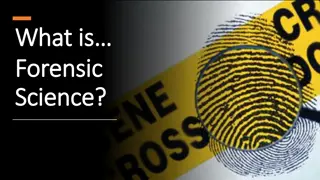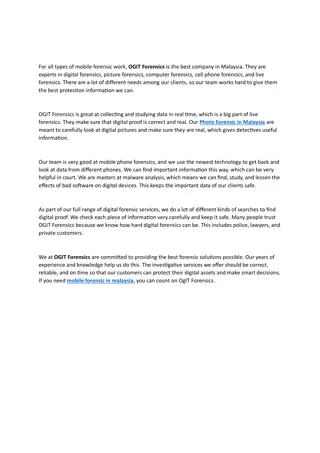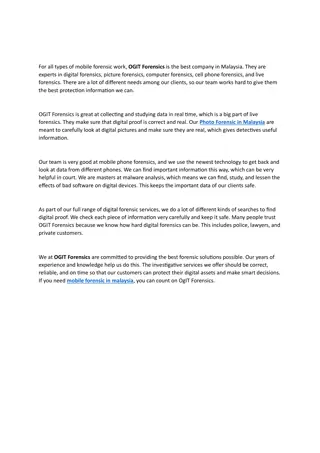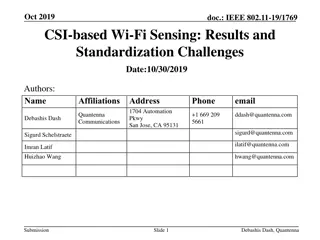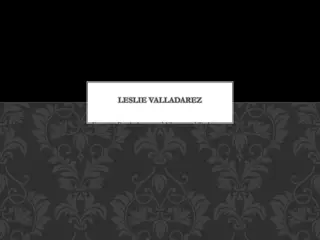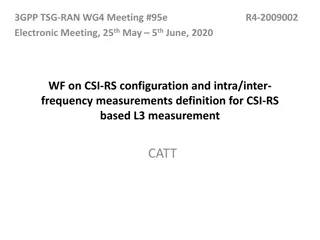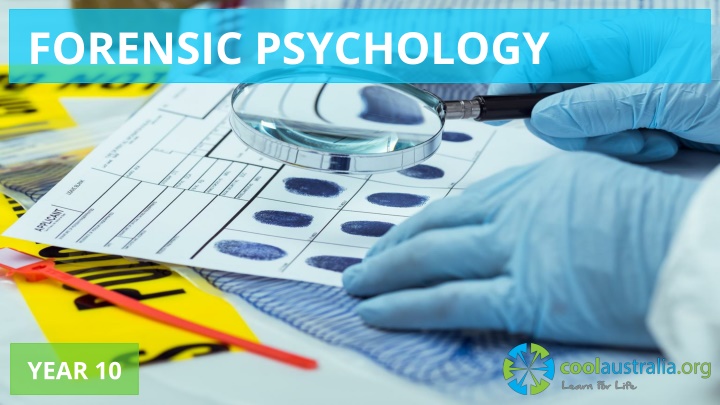
Forensic Psychology
Forensic psychology is a specialized field that applies psychological theories to legal and criminal contexts. This article explores the roles of forensic psychologists, their importance in the legal system, and the various tasks they undertake, such as criminal profiling, offender treatment, and expert testimonies in court.
Download Presentation

Please find below an Image/Link to download the presentation.
The content on the website is provided AS IS for your information and personal use only. It may not be sold, licensed, or shared on other websites without obtaining consent from the author. If you encounter any issues during the download, it is possible that the publisher has removed the file from their server.
You are allowed to download the files provided on this website for personal or commercial use, subject to the condition that they are used lawfully. All files are the property of their respective owners.
The content on the website is provided AS IS for your information and personal use only. It may not be sold, licensed, or shared on other websites without obtaining consent from the author.
E N D
Presentation Transcript
FORENSIC PSYCHOLOGY YEAR 10
Initial thoughts What is forensic psychology? What roles does a forensic psychologist have? Why is forensic psychology important? We ll discuss this one at the end
What is forensic psychology? A specialised area of psychology that applies psychological theory and skills to the understanding and functioning of the legal and criminal justice system.
What is forensic psychology? Two different cultures coming together Psychology is descriptive - how people actually behave Law is prescriptive - how people ought to behave
What is the role of a forensic psychologist? Forensic psychologists have many different roles Forensic psychological assessments Assessing dangerousness, lie detection, the insanity defense, eyewitness testimony Evaluation of evidence Criminal profiling Offender treatment Correctional psychology We re going to focus on the highlighted terms later in this lesson
What is the role of a forensic psychologist? Work is varied and may involve: Profiling a possible offender for the police Assessing a person s mental state at the time of allegedly committing the crime Assessing mental fitness to enter a plea or stand trial Giving an expert opinion on court Assessing mental state and/or treating victims or witnesses of crime Treating offenders Conducting research
What is the role of a forensic psychologist? Forensic scientists can work in: Mental health units Correctional institutions Courts Child protection services Sexual offender treatment services Domestic violence programs Police Universities or other research organisations
What is the role of a forensic psychologist? What is Forensic Psychology? Starring members of our Division of Forensic Psychology, this short film looks at the career path of a forensic psychologist and the achievements of forensic psychology. BPSOfficial - What is Forensic Psychology? (https://www.youtube.com/watch?v=HMPIvOUvqPA)
Why is forensic psychology important? What are your thoughts?
Think, pair, share: Can you catch a liar? How good are you at catching a liar? What methods would you use to tell if someone is lying or not? What methods have you seen on television shows or in movies?
Discussion: When can we lie? Is it ever appropriate to lie? When can lying be dangerous? Who benefits from a lie?
What is the role of a forensic psychologist? Pinocchio's Lie Pinocchio (2016) In-Home Release Date: Available for the first time ever on Digital HD Blu-ray: http://di.sn/60068HTRy Now a part of the celebrated Walt Disney Signature Collection, the timeless story of Pinocchio inspires a new generation with its masterful animation, award-winning music and unforgettable characters! With his faithful friend Jiminy Cricket by his side, Pinocchio embarks on fantastic adventures that test his bravery, loyalty and honesty until he triumphs in his quest for his heart s desire: to become a real boy. For more on Pinocchio, visit: Official Website: http://movies.disney.com/pinocchio Facebook: http://movies.disney.com/pinocchio Disney Movies is your official destination for trailers, exclusive clips and offers. Follow Disney Movie Rewards https://www.facebook.com/disneymovierewards/ https://www.instagram.com/DisneyMovies/ https://twitter.com/Disney_DMR Follow Disney Studios https://www.facebook.com/pg/WaltDisneyStudios/ https://www.instagram.com/DisneyStudios/ https://twitter.com/DisneyStudios Disney Movies Pinnochio s lie (https://www.youtube.com/watch?v=rUdA54Xk8cg)
Can we use the three components of emotion to catch a liar? Subjective Experience - What we feel and label as an emotion (e.g. feeling happy when we get a good score on test) Physiological Arousal How our body reacts to emotion (e.g. sweating, increased heart rate, etc.) Expressive Behavior - What others can see about what we are feeling (e.g. smiling when you see your test score) There are elements of these components that indicate lying but they are not always reliable.
1.Subjective experience Why do we lie? To create or avoid an emotion I have something to gain, so will lie to get it (i.e. driven by happiness) I have something I might lose, so need to keep it (i.e. driven by fear) Antisocial Personality Disorder Clever at deceiving and manipulating others. Compulsive Pathological Liars Start lying from young age. Lies become extensive and complicated. Uncontrollable and involuntarily. Calculated, with no remorse.
2. Physiological arousal SYMPATHETIC NERVOUS SYSTEM Autonomic Nervous System (Components) PARASYMPATHETIC NERVOUS SYSTEM Pupils dilated Pupils constricted EYES Dry Salivating MOUTH Goose bumps No goose bumps SKIN Sweaty Dry PALMS Passages dilated Passages constricted LUNGS Increased rate Decreased rate HEART Supply maximum to Supply maximum to internal organs BLOOD muscles Inhibited Stimulated DIGESTION
Polygraphs Measure physiological responses such as blood pressure, heart rate, breathing rate and galvanic skin response Galvanic skin response; linked to sweating, activation of sympathetic NS, increases sweating/GSR reading How does it work? Assumes emotion caused by telling lies will activate sympathetic NS, causing physiological arousal. Therefore, telling lies will cause an increase in blood pressure, heart rate, breathing rate and GSR.
Reliability of polygraphs Why are they unreliable? An innocent person may become fearful or anxious when asked questions A guilty person may have no remorse for the crime A person may manipulate their response to the relevant questions How can we overcome these problems?
How to beat a polygraph Polygraph Expert Shows How to Beat a Lie Detector Test Doug Williams is a former Oklahoma City detective sergeant. As an officer in the department's internal affairs and polygraph unit, he conducted thousands of polygraph tests. In the late 1970s, however, Williams began to doubt that the so-called lie detector actually is such a thing, and within a decade he had evolved into one of the most vocal, visible, and theatrical critics of the polygraph. Williams shows Bloomberg exactly how simple it is to manipulate, and beat, the lie detector test. (Video by Jennafer Savino and Justin Beach) (Source: Bloomberg) --Subscribe to Bloomberg on YouTube: http://www.youtube.com/Bloomberg Bloomberg Television offers extensive coverage and analysis of international business news and stories of global importance. It is available in more than 310 million households worldwide and reaches the most affluent and influential viewers in terms of household income, asset value and education levels. With production hubs in London, New York and Hong Kong, the network provides 24-hour continuous coverage of the people, companies and ideas that move the markets. Bloomberg QuickTake Originals Polygraph Expert Shows How to Beat a Lie Detector Test (https://www.youtube.com/watch?v=N3fHkCFxgQQ)
Lie detection The Control Question Test Control questions are designed to create a baseline of physiological responses They are not directly related to the incident being investigated Designed to create an emotional response: Control have you ever cheated on a test? Relevant question did you steal the laptop?
Jimmy Kimmel: Lie Detective Jimmy Kimmel Lie Detective #1 SUBSCRIBE to get the latest #KIMMEL: http://bit.ly/JKLSubscribe Watch the latest Mean Tweets: http://bit.ly/MeanTweets8 Connect with Jimmy Kimmel Live Online: Visit the Jimmy Kimmel Live WEBSITE: http://bit.ly/JKLWebsite Like Jimmy Kimmel Live on FACEBOOK: http://bit.ly/JKLFacebook Follow Jimmy Kimmel Live on TWITTER: http://bit.ly/JKLTwitter Follow Jimmy Kimmel Live on INSTAGRAM: http://bit.ly/JKLInstagram About Jimmy Kimmel Live: Jimmy Kimmel serves as host and executive producer of Emmy nominated "Jimmy Kimmel Live," ABC's late-night talk show. "Jimmy Kimmel Live" is well known for its huge viral video successes with 1.5 billion views on YouTube alone. Some of Kimmel's most popular comedy bits include - Mean Tweets, Lie Witness News, Jimmy's Twerk Fail Prank, Unnecessary Censorship, YouTube Challenge, The Baby Bachelor, Movie: The Movie, Handsome Men's Club, Jimmy Kimmel Lie Detective and music videos like "I (Wanna) Channing All Over Your Tatum" and a Blurred Lines parody with Robin Thicke, Pharrell, Jimmy and his security guard Guillermo. Now in its eleventh season, Kimmel's guests have included: Johnny Depp, Meryl Streep, Tom Cruise, Halle Berry, Harrison Ford, Jennifer Aniston, Will Ferrell, Katy Perry, Tom Hanks, Scarlett Johansson, Channing Tatum, George Clooney, Larry David, Charlize Theron, Mark Wahlberg, Kobe Bryant, Steve Carell, Hugh Jackman, Kristen Wiig, Jeff Bridges, Jennifer Garner, Ryan Gosling, Bryan Cranston, Jamie Foxx, Amy Poehler, Ben Affleck, Robert Downey Jr., Jake Gyllenhaal, Oprah, and unfortunately Matt Damon. Jimmy Kimmel Lie Detective #1 http://www.youtube.com/user/JimmyKimmelLive Jimmy Kimmel Live Jimmy Kimmel Lie Detective #1 (https://www.youtube.com/watch?v=KPgpRw9tiuM)
The guilty knowledge test The Guilty Knowledge Test asks multiple-choice questions, including correct answer amongst alternatives. Assumption that if person has information about a crime, they will conceal this when they recognise the correct answer This will cause change in physiological response and can be detected TEST QUESTIONS Control Question Did you steal the laptop? Guilty Knowledge Where did the thief steal the laptop? a) In the back of the gymnasium b) Near the front in the senior lockers c) On the seat in the principals office
3. Expressive behaviour High-pitched voice Slightly higher-pitched voice when lying Sometimes words out of order, muddled or spoken too quickly Micro expressions Facial expression (1/10th second) before truth Eye contact Avoiding eye contact or blinking more often Gestures and Movements More hand movements, more likely to be lying Saying no while nodding or yes while shaking head
The language of lying The language of lying Noah Zandan View full lesson: http://ed.ted.com/lessons/the-language-of-lying-noah-zandan We hear anywhere from 10 to 200 lies a day. And although we ve spent much of our history coming up with ways to detect these lies by tracking physiological changes in their tellers, these methods have proved unreliable. Is there a more direct approach? Noah Zandan uses some famous examples of lying to illustrate how we might use communications science to analyze the lies themselves. Lesson by Noah Zandan, animation by The Moving Company Animation Studio. The language of lying Noah Zandan (https://www.youtube.com/watch?v=H0-WkpmTPrM)
Body language and lying Lie To Me SUPERB BODY LANGUAGE ANALYSIS BY TIM ROTH LIE TO ME TIM ROTH BODY LANGUAGE ANALYSIS AND LIE DETECTION CONFERENCE OF A RACIST BOMBER OPENING SCENE Body language analysis - Lie to me (https://www.youtube.com/watch?v=tf8Iy_XfAIA)
Game: Two truths and a lie 1. Come up with two truths and a lie about yourself. 2. In a group, take turns to share your truths and lies and get the other people to try and guess which one was a lie. 3. At the end, discuss in your group some of the successful strategies people used to detect lies.
Other lie-detection methods Electroencephalograph (EEG) records brainwaves When a person recognizes something, they produce a P300 brainwave pattern Functional magnetic resonance imaging (fMRI) Areas of frontal lobe more active when telling a lie or hiding the truth Heat Sensor Camera Detect increased blood flow
Witnessing a crime Eyewitness testimonies are the accounts from witnesses present at crime scene. Wrongful convictions Many convictions based on eyewitness testimony have been overturned due to DNA or other evidence proving innocence How does this happen? It s all to do with memory!
The three stages of memory 1. Encoding 2. Storage Information must first be converted into a form that our brain can understand This can be affected by emotional state and attention Events will enter short term memory (STM), but not be stored into long-term memory (LTM) if there is no significance to the person. We rely on LTM for recalling events we have witnessed. 3. Retrieval Recalling information from memory to use. Eyewitness accounts require autobiographical memory, (recalling events we have experienced).
Factors affecting eyewitness testimony 1. Psychological factors Testimony can be influenced by other memories, prejudices, beliefs and expectations. Retrieval of memory is most efficient when in the same state of consciousness as when the memory was created (known as state-dependent cues ). 2. Environmental factors Recording of memories can be distorted and shaped by the context and aspects of the event. Retrieval of memory is most efficient when in the same context or situation (known as context-dependent cues ).
Misleading information Forensics - Making a Case. Interviewing Witnesses. Weapon Focus. What do you remember? Forensics - Making a Case. Interviewing Witnesses. Weapon Focus. 1. Weapon focus The presence of a weapon in a situation influences memory of an event, distracting us from the other details of the crime. 2. Reconstructive memory When memories are shaped by our own beliefs and expectations of what we expect to have occured. What Do They Remember About the Crime Eyewitness BBC Two YouTube Forensics - Making a Case. Interviewing Witnesses. Weapon Focus. What do you remember? (https://www.youtube.com/watch?v=-yTUjsHS5vU)
Forgetting The more time a witness observed an event, the more likely they paid attention and stored details of the event accurately. Memory becomes less accurate as time goes by. How might this influence eyewitness testimony?
Capturing eyewitness testimony Photofit An image that represents the face of the suspect Allows a witness to see a bunch of facial features and stick them together Hopefully at the end it looks like the suspects They can also get police to draw artistic impressions of that person
Capturing eyewitness testimony Suspect line-up Several suspects, not just one or two, must fit the description given by the witness(es). Without these checks, the police might arrest the wrong person through limited suspect choices or biases towards a specific person. Based on what we ve discussed, what might be some issues with photofits and police line ups?
Problems with line-ups and photofits Witnesses may have an expectation that the suspect is in the line-up, leading to mistakenly identifying wrong person. Eyewitnesses may have observed suspect in less-than-ideal conditions (poor lighting, time, etc.). Photographs used for identification may not highlight features that eyewitness paid attention to.
More resources at Cool Australia For more cool resources head to www.coolaustralia.org to explore over 900 free-to-access, Australian curriculum and EYLF aligned activities, lessons and resources for teachers. Students can explore videos, news articles, pictures and factsheets in the digital library - www.coolaustralia.org/student-toolbox/

